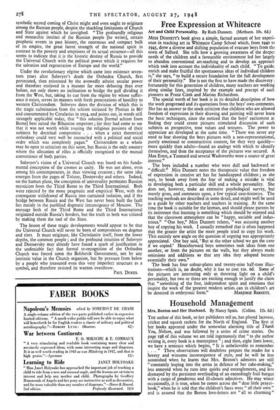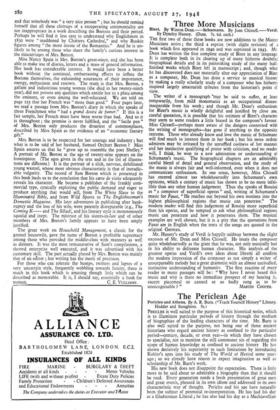Household Management
Mrs. Beeton and Her Husband. By Nancy Spain. (Collins. 12s. 6d.)
Tire author of this book, so her publishers tell us, has played lacrosse, cricket and squash rackets for the North of England. The first of her books appeared under the somewhat alarming tide of Thank You, Nelson, and was followed by a series of crime stories. On page 198 of this volume we are told ingenuously that " to the author writing it, every book is a masterpiece " ; and then, eight lines lower, we have a sentence which begins, " It is unbelievable to remember . . . " These observations will doubtless prepare the• reader for a breezy and winsome inconsequence of style, and he will be less astonished when he learns that Mrs. Beeton's admirers are still " constantly leaping into the arena in defence of her cake-making," less annoyed when he runs into quirks and entanglements, and less dismayed by the persistent overloading of an exceedingly frail barque with a cargo of ponderous and ill-chosen adjectives. He may wince occasionally, it is true, when he comes across the " dear little prayer- book," when he is told that the children's faces were " all their own " and is assured that the Beeton love-letters are " all so charming " and that somebody was " a very nice person" ; but he should remind himself that all these chirrups of a recuperating sentimentality are not inappropriate in a work describing the Beetons and their period. Perhaps he will find it less easy.. to understand why Englishmen in 183o were " maddened by Chartres Cathedral," and why Ruskin figures among " the more insane of the Romantics." And he is un- likely to be among those who share the family's curious interest in the miscarriages of Mrs. Beeton.
Miss Nancy Spain is Mrs. Beeton's great-niece, and she has been able to make use of diaries, letters and a mass of general information. Her book has considerable interest. It would have been a better book without the continual, embarrassing efforts to inflate the Beetons themselves, the exhausting assurances of their importance, energy, enthusiasm and renown. The truth is that Mrs. Beeton, a gallant and industrious young woman (she died in her twenty-ninth year), did not possess any qualities which entitle her to a place among the eminent, or even among the well-educated. We are told on page 125 that her French was " more than good." Four pages later, we read a passage from Mrs. Beeton's diary in which she speaks of three Frenchmen who "had a grand desire de fumer." If this is a fair sample, her French must have been worse than bad. And so it is throughout ; the promise is never fulfilled, and the " facile pen " of Mrs. Beeton only produces the dreariest of commonplaces, described by Miss Spain as the evidence of an " economic literary gift."
Mrs. Beeton is to be respected for her courage and industry ' - but what is to .be said of her husband, Samuel Orchart Becton ? Miss Spain assures us that he " grew up to resemble the poet Shelley." A portrait of Mr. Beeton at the age of twenty-nine appears on the frontispiece. (The ages given in the text and in the list of illustra- tions are different.) It is the portrait of a slick, nervous, debilitated young wastrel, whose most obvious characteristic is that of ineradic- able vulgarity. The record of Sam Beeton which is presented in this book leads us to the conclusion that his carte de visite adequately reveals his character. He became a publisher of the frankly com- mercial type, cynically exploiting the public demand and eager to produce anything that would sell, from The White Slave to the Illuminated Bible, and from Wild Sports to The Englishwoman's Domestic Magazine. His later adventures in publishing after bank- ruptcy and the loss of his wife, were patently disreputable (e.g., The Coming K— and The Siliad), and his literary style is monotonously squalid and inept. The mistrust of his sisters-in-law and of other members of Mrs. Beeton's family appears to have been amply justified.
The great work on Household Management, a classic for the genteel housewife, gave the name of Beeton a profitable supremacy among those who provided the middle-class with manners as well as dinners. It was the most remunerative of Sam's compilations, a shrewd enterprise well executed, and it was advertised with his customary skill. The part actually played by Mrs. Beeton was mainly that of an editor ; her writing has the merit of precision.
For those who can tolerate the bumps, twitters and lapses of a very uncertain style, frequently wobbling towards fatuity, there is much in this book which is amusing though little which can be described as memorable. It is, I should say, essentially a book for



































 Previous page
Previous page